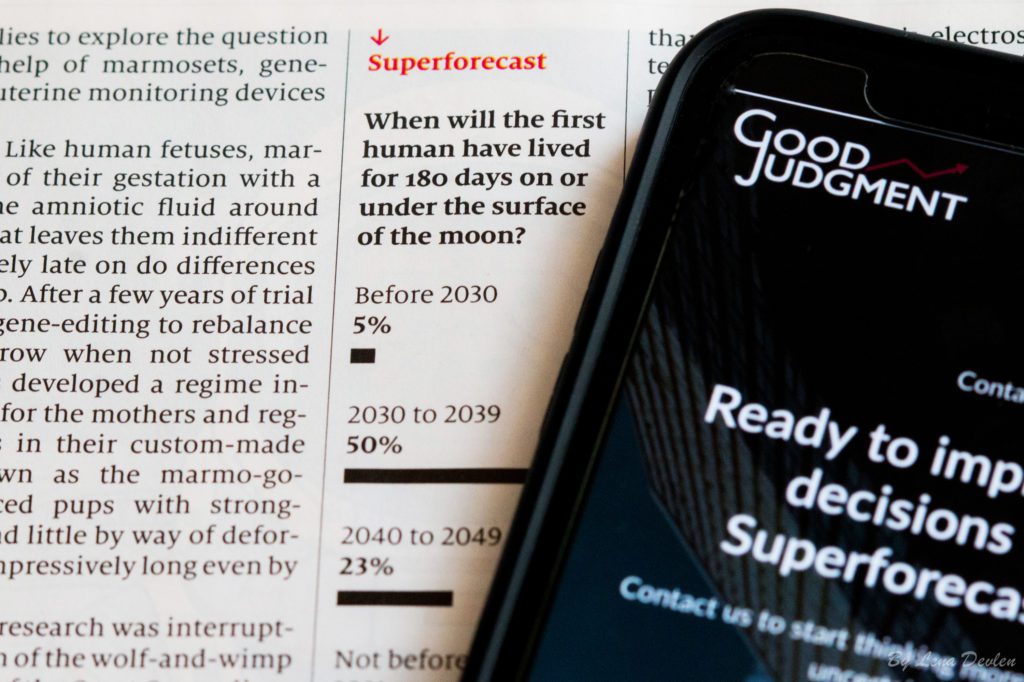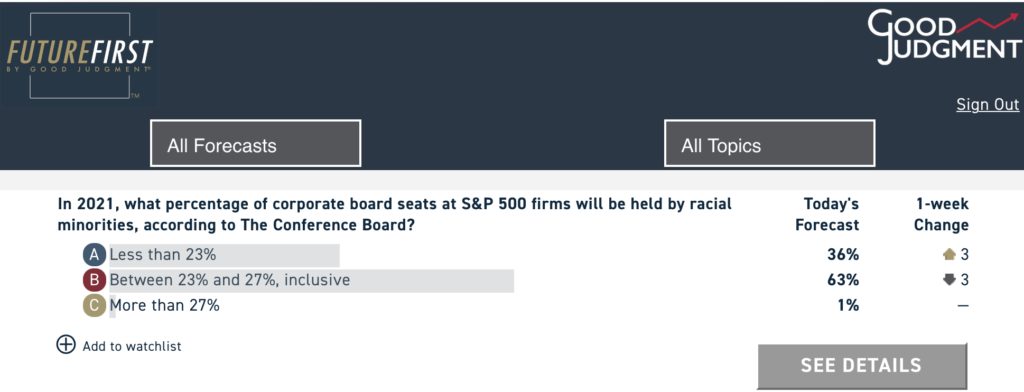 This summer, Good Judgment Inc collaborated with The Economist for the newspaper’s annual collection of speculative scenarios, “What If.” The theme this year was the future of health. In preparing the issue, The Economist asked the Superforecasters to work on several hypothetical scenarios—from America’s opioid crisis to the possibility of the Nobel prize for medicine being awarded to an AI. “Each of these stories is fiction,” the editors wrote in the 3 July edition, “but grounded in historical fact, current speculation, and real science.”
This summer, Good Judgment Inc collaborated with The Economist for the newspaper’s annual collection of speculative scenarios, “What If.” The theme this year was the future of health. In preparing the issue, The Economist asked the Superforecasters to work on several hypothetical scenarios—from America’s opioid crisis to the possibility of the Nobel prize for medicine being awarded to an AI. “Each of these stories is fiction,” the editors wrote in the 3 July edition, “but grounded in historical fact, current speculation, and real science.”
This was unlike most of the work that Good Judgment Inc does for clients. Our Superforecasters typically forecast concrete outcomes on a relatively short time horizon to inform decision- and policymakers about the key issues that matter to them today. The Economist’s “What If” project instead focused on a more speculative, distant future. To address the newspaper’s imaginative scenarios without sacrificing the rigor that Good Judgment’s Superforecasters and clients have become accustomed to, our question generation team crafted a set of relevant, forecastable questions to pair with each topic.
As a result, The Economist’s “What if America tackled its opioid crisis? An imagined scenario from 2025” was paired with our Superforecast: “How many opioid overdoses resulting in death will occur in the US in 2026?”
“What if biohackers injected themselves with mRNA? An imagined scenario from 2029” was paired with: “How many RNA vaccines and therapeutics for humans will be FDA-approved as of 2031?”
And “What if marmosets lived on the Moon? An imagined scenario from 2055” was paired with: “When will the first human have lived for 180 days on or under the surface of the moon?”
Superforecaster, Social Scientist, and Archaeologist of Tempe, Arizona, Karen Hagar participated in forecasting these “far into the future” questions because, she says, she likes challenges.
“These questions were different than standard forecasting questions which typically resolve a year into the future,” she explains. “Both types of questions have inherent challenges. The questions with shorter resolution require extreme accuracy. One must research and mentally aggregate all incoming information. This includes any possible Black Swan events, current geopolitical and any social developments that may change within the short time frame. The dynamics of predicting outcomes of questions 10-20 years into the future required the same skill, but possibly even more research.”
The most exciting aspects of the “What If” project for Karen included learning the degree to which science has advanced. “For example, uncovering the scientific data regarding CRISP.R technology and its application to Alzheimer’s research was amazing,” she says.
In making her forecasts for The Economist, she studied the questions from all angles and played devil’s advocate to challenge her colleagues’ thinking. This technique of red-teaming is frequently used by professional Superforecasters to confront groupthink and elicit more accurate predictions.
“What If” is only one of Good Judgment’s several collaborative projects with The Economist. The newspaper’s “World in 2021,” recurring annually since the “World in 2017” and looking to forecast key metrics for the year ahead, consisted of questions that had shorter time horizons and were of immediate importance to decision-makers.
Superforecaster and Show Producer JuliAnn Blam says she is particularly interested in forecasting questions that focus on economic issues and the “World in 2021” project “didn’t disappoint.”
“The questions tended to be more pertinent to everyday life and issues that were of practical interest to me,” JuliAnn explains.
The “World in 2021” project included forecasting the world’s GDP growth, ESG (Environmental, Social, and Governance) investment, and work-from-home dynamics. But one of JuliAnn’s favorite questions was about racial diversity of board members in S&P 500 companies.


“That one was hopeful, ‘woke’, and had me looking more closely at what a diversified board of directors can bring to a company’s outlook, marketing, product line, treatment of employees, etc.,” JuliAnn says. “It was a sort of stepping stone to looking into a lot more than just how many companies will appoint board members of color within the next year, and pushed the argument of why they should and what they would gain by doing so.”
Despite having a shorter time span than the “What If” forecasts, the “World in 2021” also required taking into account numerous factors, some of which weren’t even on the horizon when the questions were launched in October 2020. Take, for instance, the global GDP question.
“There are so many factors to consider, between Xi and Evergrande and the resultant fallout of the cascade from that default, to new COVID variants stopping workforces, anti-vax movements, the infrastructure bill and the green new deal, and then inflation,” JuliAnn says. “Tons to balance and think about!”
Whether it’s a forecast of global GDP next year or a possibility of using the Moon as a base for space exploration in the following decade, the Superforecasters always apply their rigorous process and tested skills to provide thoughtful numeric forecasts on questions that matter. As for their reward, Karen puts it best: “The enjoyment from forecasting is honing and improving forecasting skill, acquiring new information, and interacting with intellectuals of the same knowledge base.”
You can find Good Judgment’s Superforecasts on the “What If” questions in The Economist’s print edition from 3 July 2021 or on their website, or ask us about a subscription to FutureFirst, Good Judgment’s forecast monitor, to view all our current forecasts from our team of professional Superforecasters.
Schedule a consultation to learn how our FutureFirst monitoring tool, custom Superforecasts, and training services can help your organization make better decisions.